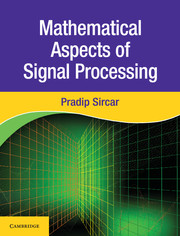1 - Paradigm of Signal Processing
Published online by Cambridge University Press: 23 July 2017
Summary
Introduction
Signal processing is a branch of applied mathematics. The primary aim of signal processing is to extract information from a given-set of data, a procedure known as signal analysis, or conversely, to use information in generating data with some desirable property, a procedure known as signal synthesis. Mathematical methods are developed based on concepts from mathematics with the purpose of signal processing as an area of application. Various mathematical concepts find use in signal processing, and a systematic introduction of those mathematical concepts to the students who will become researchers and professionals in this area, has become an essential part of the curricula worldwide.
When the mathematical ideas are introduced in a course of mathematics, they are presented as abstractions. Theories are built in structured manner, based on the present state of knowledge and the aspiration of the mathematician to extend knowledge in some desired direction. A mathematician is often not concerned of the areas of application of the developed theories. In contrast, a researcher engaged in signal processing often considers an established theory and identifies ways how it can be adopted and applied in extracting information inherent in data or for generating data with some desirable property.
It is the purpose of the present book to introduce the mathematical concepts and their interpretations related to signal processing. It is illustrated how basic concepts mould into mathematical methods, and mathematical methods perform signal processing tasks. We take up the case study of spectral estimation of a signal in the next section. The spectral estimation, by definition, refers to computing the energy spectral density of a signal with finite energy or the power spectral density of a signal with finite power. In the case study, however, we generalize our tasks by stating that primarily we are interested in finding the frequency-content of a signal, and computation of the energy-level or power-level at each frequency is our secondary purpose. This case study will illustrate various connections of signal processing with mathematics.
- Type
- Chapter
- Information
- Mathematical Aspects of Signal Processing , pp. 1 - 21Publisher: Cambridge University PressPrint publication year: 2016



